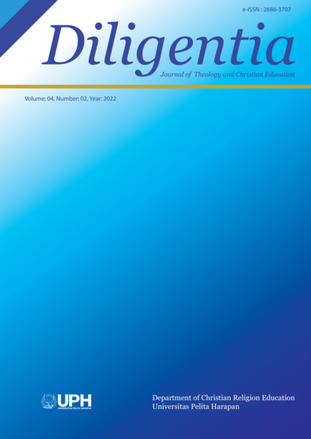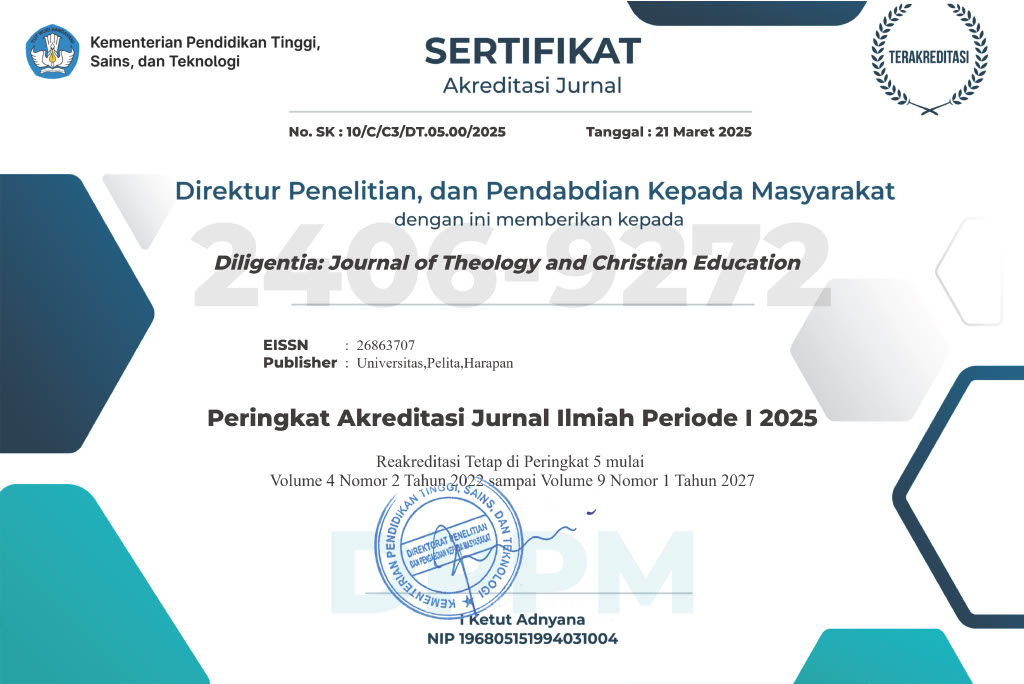Penerapan Biblical Based Integration pada Mata Pelajaran Ilmu Pengetahuan Alam di Sekolah Kristen ABC Sukoharjo, Jawa Tengah [The Implementation of Biblical Based Integration in Science Subject in ABC Christian School in Sukoharjo, Central Java]
DOI:
https://doi.org/10.19166/dil.v4i2.5323Kata Kunci:
Bible based integration, relegating the Bible, referencing the Bible, responding the Bible, perception, integrasi berdasarkan Alkitab, mereferensikan Alkitab, merespondenkan Alkitab, persepsiAbstrak
Teachers at a christian school ABC in Sukoharjo, Central Java are expected to implement Bible Based Integration in every lesson of the teaching. The purpose of this research was to explain the implementation of the Bible Based Integration by teachers who taught science subjects (physics, chemistry, and biology) at Christian senior high school in Sukoharjo, Central Java. A qualitative case study was conducted to explain the purpose of this research. Six science teachers were involved as subjects of this research. Research data were collected by interviewing those six teachers as well as observing their own classrooms. Interviewing students, three students from each grade (X, XI, XII) along with collecting some lesson plans of those teachers were also conducted. The data were qualitatively analyzed by coding, classifying, and labeling the data then relating each labeled data with the related literature. Data analysis showed those six teachers used three approaches to implement Bible Based Integration: relegating, referencing, and responding to the Bible. The data also revealed the teachers’ perceptions towards the Bible Based Integration.
BAHASA INDONESIA ABSTRACT: Guru-guru di sekolah Kristen ABC di Sukoharjo, Jawa Tengah diharapkan dapat mengimplementasikan Integrasi Berbasis Alkitab dalam setiap pelajaran yang diajarkan. Tujuan dari penelitian ini adalah untuk menjelaskan implementasi Integrasi Berbasis Alkitab oleh guru yang mengajar mata pelajaran sains (fisika, kimia, dan biologi) di SMA Kristen di Sukoharjo, Jawa Tengah. Sebuah studi kasus kualitatif dilakukan untuk menjelaskan tujuan penelitian ini. Enam guru sains dilibatkan sebagai subjek penelitian. Data penelitian dikumpulkan dengan mewawancarai keenam guru tersebut dan juga mengamati kelas mereka sendiri. Wawancara dengan siswa, tiga siswa dari setiap kelas (X, XI, XII) serta mengumpulkan beberapa rencana pembelajaran dari guru-guru tersebut juga dilakukan. Data dianalisis secara kualitatif dengan cara mengkodekan, mengklasifikasikan, dan memberi label pada data, kemudian menghubungkan setiap data yang telah diberi label dengan literatur terkait. Analisis data menunjukkan bahwa keenam guru tersebut menggunakan tiga pendekatan dalam mengimplementasikan Integrasi Berbasis Alkitab: merelevansikan, merujuk, dan merespons Alkitab. Data juga menunjukkan persepsi para guru terhadap Integrasi Berbasis Alkitab.
Referensi
Berkhof, L., and Cornelius van Til. Dasar Pendidikan Kristen. Surabaya, Indonesia: Momentum, 2013.
Cooper, Monte Vaughan. “Faculty Perspectives on The Integration of Faith and Academic Discipline In Southern Baptist Higher Education.” Religious Education 94, no. 4 (1999): 379-95. https://doi.org/10.1080/0034408990940402
Creswell, John W. Research Design: Pendekatan Kualitatif, Kuantitatif, Dan Mixed. Yogyakarta, Indonesia: Pustaka Pelajar, 2014.
Harris, Robert A. The Integration of Faith and Learning: A Worldview Approach. Eugene, OR: Cascade Books, 2004.
Hasker, W. “Faith-Learning Integration: An Overview.” Christian Scholar’s Review 21, no. 3 (1992): 234-248.
Holmes, Arthur Frank. Segala Kebenaran Adalah Kebenaran Allah. Surabaya, Indonesia: Momentum, 2005.
Knight, George R. Filsafat & Pendidikan: Sebuah Pendahuluan Dari Perspektif Kristen. Tangerang, Indonesia: Universitas Pelita Harapan, 2009.
Lambert, Mike. A Beginner’s Guide to Doing Your Education Research Project. Thousand Oaks, CA: SAGE Publications, 2012.
MacCullough, M. E. How to Develop a Teaching Model for Worldview Integration. Eugene, OR: Philadelphia Biblical University, 1999.
Mvududu, Nyaradzo. “Challenges to Faithful Learning and Teaching: The Case of Statistics.” Christian Higher Education 6, no. 5 (2007): 439-45. https://doi.org/10.1080/15363750701268285.
Pearcey, Nancy. Total Truth: Liberating Christianity from Its Cultural Captivity (Study Guide Edition). Wheaton, IL: Crossway, 2018.
Poythress, Vern S. Menebus Sains: Pendekatan Yang Berpusat Kepada Allah. Surabaya, Indonesia: Momentum, 2013.
Ream, Todd, Michael Beaty, and Larry Lyon. “Faith and Learning: Toward a Typology of Faculty Views at Religious Research Universities.” Christian Higher Education 3, no. 4 (2010): 349-72. https://doi.org/10.1080/15363750490507375.
Schein, Edgar H. Organizational Culture and Leadership. 2nd ed. San Francisco, CA: Jossey - Bass, 1992.
SMA Kristen Sukoharjo, Modul Guru Berbasis Integrasi Alkitabiah. Sukoharjo, Indonesia: SMA Kristen Sukoharjo, 2013.
Smith, B. “Biblical Integration: Pitfalls and Promise.” BJU Press, 2012. https://www.bjupress.com/images/pdfs/bible-integration.pdf.
Stevenson, Daryl H, and Paul D Young. “The Heart of the Curriculum? A Status Report on Explicit Integration Courses in Christian Colleges and Universities.” Journal of Psychology and Theology 23, no. 4 (1995): 248-60. https://doi.org/10.1177/009164719502300404.
Tung, Khoe Yao. Filsafat Pendidikan Kristen. Yogyakarta, Indonesia: ANDI, 2013.
Turley, Stephen Richard. “Paideia Kyriou: Biblical and Patristic Models for an Integrated Christian Curriculum.” Journal of Research on Christian Education 18, no. 2 (2009): 125-39. https://doi.org/10.1080/10656210903046382.
Van Brummelen, Harro. Batu Loncatan Kurikulum. Tangerang, Indonesia: Universitas Pelita Harapan, 2008.
Van Brummelen, Harro. Berjalan Dengan Tuhan Di Dalam Kelas. Tangerang, Indonesia: Universitas Pelita Harapan, 2006.
Unduhan
Diterbitkan
Cara Mengutip
Terbitan
Bagian
Lisensi
Authors who publish with this journal agree to the following terms:
1) Authors retain copyright and grant the journal right of first publication with the work simultaneously licensed under a Creative Commons Attribution License (CC-BY-SA 4.0) that allows others to share the work with an acknowledgement of the work's authorship and initial publication in this journal.
2) Authors are able to enter into separate, additional contractual arrangements for the non-exclusive distribution of the journal's published version of the work (e.g., post it to an institutional repository or publish it in a book), with an acknowledgement of its initial publication in this journal.
3) Authors are permitted and encouraged to post their work online (e.g., in institutional repositories or on their website). The final published PDF should be used and bibliographic details that credit the publication in this journal should be included














